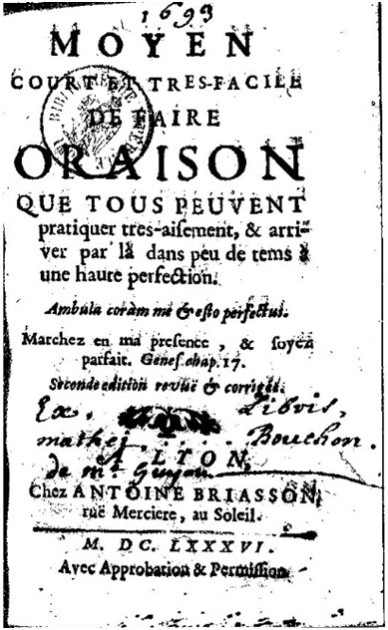An itinerant mystic
Fortified by this conviction, Madame Guyon, widowed at the age of 28, did not seek to profit from an inheritance which, with her new freedom, might have opened the doors of another social life to her. Rather, she set out on an adventure to spread the word and the presence of God. She was convinced that an apprenticeship in the interior life, the wakening of an awareness of the presence of God in the soul was open to everyone and could have important consequences for the whole of society. But of course the clergy and the church did not see it in the same way. In that era women were not recognised in public life. First and foremost they were destined for domestic life, ruled by their husbands, and if they turned to religious life, they had to be cloistered and remain closed in: it was unthinkable that a woman could adopt the way of life of a wandering monk[1]. Thus Madame Guyon was first restrained from involving herself at Gex in the house of the 'New Catholics', near Geneva, where young girls were being removed from 'the religion claiming to be reformed'. But she soon left, using a large part of her fortune to pacify the priests and to ward off their desire to catch up with her as far as possible. A little later, after having composed one of her best known works (Les Torrents near Léman, she was based in Grenoble, successfully preaching the prayers of quietude to a public of nuns and bourgeoisie in the town. Her teaching at that time, at first with the consent of the local bishop, is contained in one of the rare books authorised for publication during her lifetime: Le moyen court pour faire oraison of 1686 [2]. She quickly drew a fairly considerable audience and it was necessary to produce another addition of her book to satisfy demand from the nuns. It was also the moment when, for the first time, Madame Guyon became a cause for serious concern. In particular, the minister general of the Order of Chartreux denounced her with virulence. Could a women without theological training teach the ways of experiencing God? By what authority did she speak, she, a simple laywoman? What was this spirituality which did not concern itself with salvation and which recommended letting oneself by led by God? Was not this teaching an incitement to deny legitimate authority, a kind of anarchism, even a delusion? On leaving the region, Madame Guyon took care for a good while to be more discrete and not to cause further anxiety; she made faithful friends, including Father Lacombe[3].







